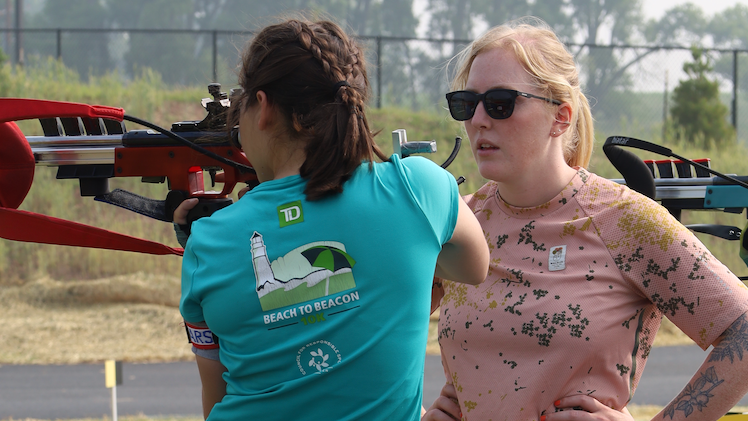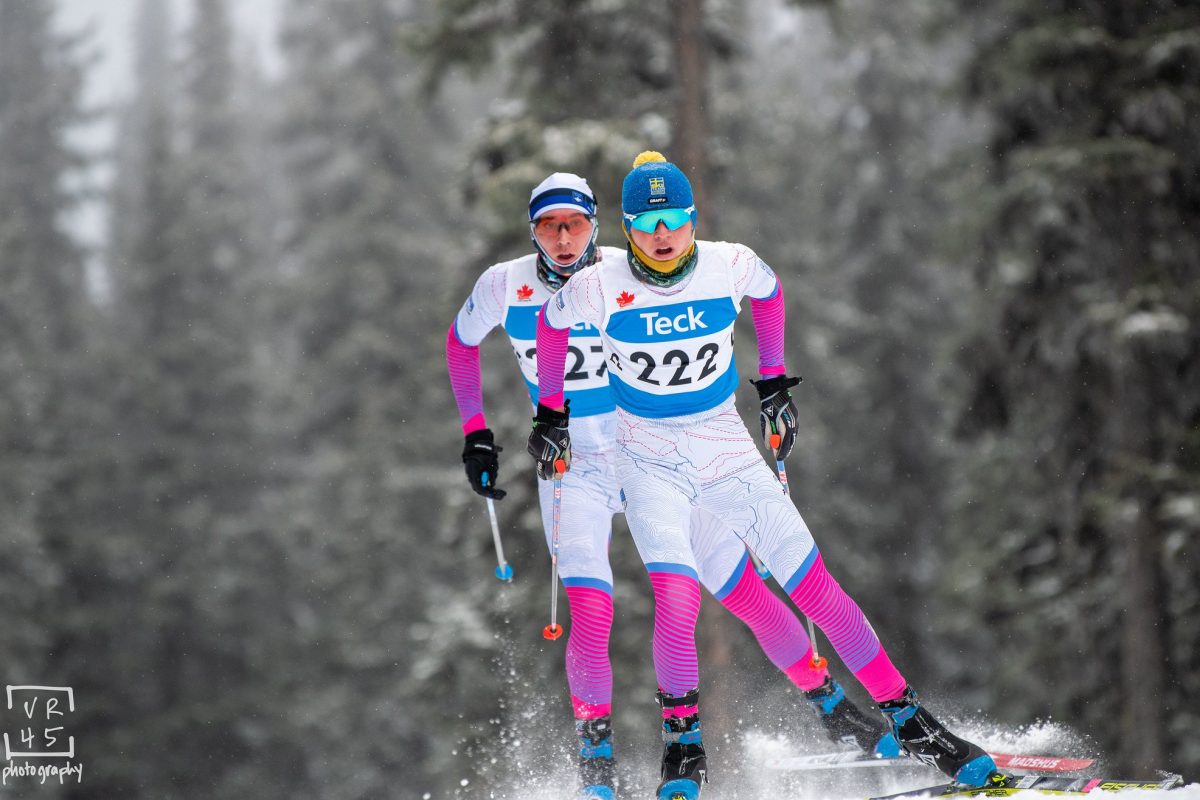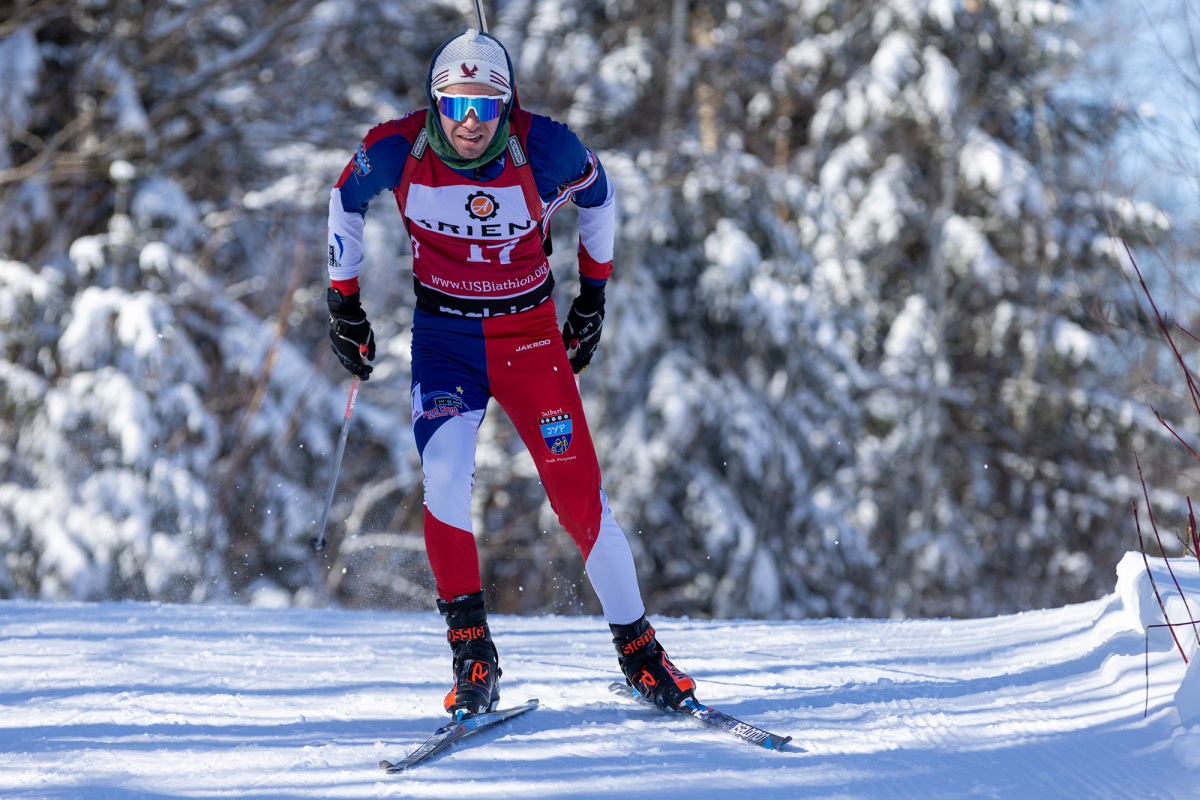
When Thursday’s men’s relay in Oberhof, Germany kicked off, the television cameras could barely even show the start.
After days of rain and warm conditions, the snow gods of Thuringia finally decided to let the World Cup biathletes see their worst. The snow was falling so thickly that zoomed shots from the cameras could barely pick out the skiers.
“That was one of the hardest relays during my coaching career,” said U.S. Head Coach Per Nilsson. “Add really gusting wind and then it’s a big challenge for everything: shooting, waxing, ski selection. And it’s important to keep a good ski tech!”
But while it was certainly not pleasant for Nilsson and his crew to stand on the sidelines, exposed to the snow and icy blasts of cold air, it was even harder for the athletes.
“It was heavy snow from the start, and the high winds made visibility extremely difficult at times,” explained U.S. star Lowell Bailey. “But, the positive thing about today was that it was a mass start situation, so that every team had to battle the same conditions.”
In terms of snow, the leadoff skiers undoubtedly had it the worst, since the squalls stopped midway through the second leg of the relay. Especially on the first loop, the leaders plowed through a thick layer of powder. Range workers, including the race director himself, worked overtime to keep the shooting mats clear while the racers were out on course.
But while the skiing was hardest and the visibility worst for each team’s scramble leg, some of the worst gusts of wind took place during the second leg.
“I am still not sure where some of my shots went,” Italian racer Markus Windisch said in a press conference.
He wasn’t alone: across the entire field, 22 teams of four men each, only two racers were able to hit ten targets without resorting to spare rounds. They were Tobias Arwidson of Sweden, the scramble leg who skied so slowly that he still managed to tag off in 13th place, and Norway’s Emil Hegle Svendsen, who was the fastest of the anchor skiers and moved his team from tenth to fifth while cutting well over a minute out of the leaders.
Svendsen was the only Norwegian mainstay on the team, as the other top racers rested. And he felt bad for his teammates, who were just getting their feet wet on the World Cup.
“It was awful that it would be so difficult,” he told Norwegian broadcaster NRK. “I got a little better conditions than they did. It will always be easier for them next time.”
Because while Svendsen was lucky (or talented), the rest of the field racked up spare rounds and penalty loops, in numbers that are rarely seen in relays.
The winning team, Italy, prevailed mainly because they were able to somehow shoot through the snow and wind and hit the targets. The four men only missed a total of five shots, the least in the field, and by using spare rounds avoided the penalty loop.
Even the team members themselves weren’t exactly sure how it had happened; Windisch admitted that they had needed some luck to hit all the targets, calling it a difficult race both physically and mentally.
But even with flawless shooting, the Italians had to work for their victory, and didn’t lead the race until the very end.
The Russians, instead, had been at the front for almost the entire evening, and seemed poised to match their win in the women’s relay yesterday. Each of the first three racers had skied the fastest or second-fastest time of their leg, and by the time Evgeny Ustyugov had to hit the penalty loop twice in the third leg, he had such a cushion that he still left the range with a 30-second lead.
Russian anchor Alexey Volkov, however, had trouble almost as soon as he received the handoff. First he missed a shot on the range, and then took two spare rounds to hit the target, allowing Lukas Hofer of Italy to close the gap to seven seconds.
Then, he slowed on the trails, turning in only the ninth-fastest anchor leg. By the time the men entered the range for the last time, Hofer had passed the Russian.
The pair shot almost in unison. Each missed their second shot, and then each used a single spare round to knock the last target down. As they left the range together, the race was on.
But was it? Hofer attacked and was able to drop Volkov almost immediately. Both looked tired, and the five-second gap that had developed with 500 meters to go didn’t look like it could be closed by the Russian.
“At the beginning, I saw that Volkov was just 10 meters behind, and then in the last 200 meters, I was fighting hard and saw in the last 100 that he gave up,” Hofer said in a press conference.
The Italians – who were seeded 12th coming into the relay – were going crazy. As Hofer neared the stadium, the support staff ran beside him, jumping into the air, shouting, and pumping their fists.
When he crossed the finish line with his arms raised, the reception from his team was just as ecstatic. It was the first Italian victory in any biathlon event in 12 years – not since Rene Cattarinussi stood atop the podium in March 2000 has an Italian man won a World Cup. Today, four of them did.
“All of us made very good races,” Hofer told the press. “We fought hard… It was perfect for all of us so I think we can be happy with this win.”
Germany had appeared to have third place locked down coming into the final shooting stage, but veteran Arnd Peiffer took all three spare rounds to hit his targets. In the process, Sweden’s Carl Johan Bergman left the range and turned in the second-fastest final loop.
“I was worried that he would be back because I was worn out on the final round,” Bergman told Swedish newspaper Svenska Dagbladet.
So was Peiffer, however, and he knew it. The German made no effort to close the gap to the Swede and even though he had been just seven seconds back after the final shooting, he ceded another 24 to Bergman over the last 2.5 k.
Svendsen brought it home for Norway in 5th, outsprinting Austria’s Christoph Sumann in the final meters.
Glimmers of Greatness, Then Disappointment for Americans
U.S. scramble leg Lowell Bailey had a good day, using two spare rounds in the variable conditions and tagging off in fifth place.
“I was happy with my race and it felt good to get back in the competitive atmosphere after the Christmas break,” he told FasterSkier.
But after he tagged off, the U.S. team experienced a bit of a roller coaster, thanks to the weather.
“It was a crazy race today,” Bailey said. “As you saw, it was kind of luck of the draw as to whether there was calm conditions or a hurricane in the range. It was changing from one minute to the next.”
Unfortunately, some of the worst gusts came when Jay Hakkinen was on the range. The veteran, who has already notched a top-ten finish this season, struggled on not one but both of his shooting stages. In prone and standing, he used all three available spare rounds, and was still left with three total penalty loops.
“At one point when Jay was on the range, I was standing in the start corral about 100 meters away, and I couldn’t see the shooting because a huge gust had blown so much snow into the air,” Bailey said.
“You could be lucky or unlucky when hitting the shooting mat,” lamented head coach Nilsson. “It could gust hard for 30-40 seconds and then be OK for a while.”
Hakkinen’s struggles dropped the team to 13th by the next handoff. It wasn’t where the Americans, who were seeded ninth, had hoped to be.
“Of course I was hoping to start with better contact to the top ten, but I knew that anything was possible today with such hard conditions,” said Tim Burke, who received the tag from Hakkinen.
Burke did do his best, and it worked – despite using four rounds in what he described in an understatement as “some super tricky shooting conditions”, the former World Cup leader’s aggressive skiing catapulted the team five spots up the results list.
“Overall I was pleased with my leg,” he said.
Leif Nordgren took over for the final leg and encountered his own share of trouble on the trail. In the first shooting stage, he had to use all of his spare rounds and still ski a penalty loop. But by the time he reached the standing stage, Nordgren was back to his usual sharpshooting self, and cleaned the targets easily, something none of his teammates had accomplished.
By the finish, the U.S. had dropped out of the top ten again and had to settle for 11th, adrift in no-mans-land between Ukraine and Bulgaria.
“We had bigger hopes than this,” Nilsson told FasterSkier while simultaneously noting that 11th place wasn’t bad. “Training was good leading up to the race and the athletes handled the wind well in training. We had a good feeling, but it was not the outcome we hoped for.”
The result was another in a string of frustrating relays; while the U.S. men have had several standout performances so far this season, they can’t seem to perform well on the same day. It’s especially tough since their expectations were raised after a sixth-place finish in the World Championships relay in March.
“I know that we have a really good team, we just haven’t shown it in the relays… yet,” said Bailey.
“We still need to get shooting better in the relays,” Nilsson said. “We will continue to work with each athlete for the shooting and just try to do the normal work… that sounds simple but it is the key to success for us. The athletes probably get bored when we tell the same thing over and over again, but we will not stop until they do it!”
After being sick over the holidays, Burke was happy just to put in a hard effort. As such, he was able to put the team’s result in perspective and find some positives that didn’t have to do with team rankings.
“It was really important for me to get in a solid race effort before the sprint on Saturday and today definitely accomplished that,” Burke explained.
Nilsson, too, looked to the future.
“We are looking forward to the individual races here, and every athlete can bring something positive from the race today even if it was not perfect,” he concluded.



